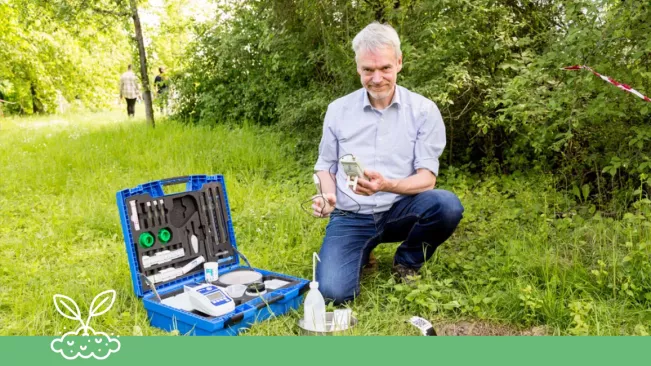International Centre for Sustainable Development (IZNE)
Optimising urban green spaces with AI: New "EcoTwin" research project started

Challenge: Climate change and its impact on urban green spaces
Two global megatrends - increasing urbanisation and climate change - are leading to a mutually reinforcing stress situation that poses considerable challenges for urban areas. Both the increase in heat waves and extreme drought as well as the dangers posed by heavy and continuous rainfall cannot be averted without sustainable land management.
Urban green spaces play a key role in mitigating these effects by providing cooling and water storage functions while promoting biodiversity. However, their effective utilisation is highly dependent on the specific characteristics of individual areas. It is therefore crucial to develop customised, data-based solutions that meet the diverse requirements and conditions of urban green spaces.
"In North Rhine-Westphalia, the data basis for climate and disaster prevention measures is excellent. As a result, there is no lack of data or techniques for collecting relevant environmental data, but rather a lack of data processing, interpretation and visualisation in order to implement concrete climate adaptation measures on the ground," says project manager Professor Martin Hamer
Objective: Smart management of urban green spaces
The main objective of "EcoTwin" is therefore to optimise the use of urban green spaces through the use of a digital twin. The digital twin is intended to provide environmental and green space authorities as well as climate managers with precise data and recommendations for action based on the specific characteristics of the green spaces. Citizens are also involved and can actively contribute to the maintenance and improvement of their private green spaces.
The project is a cooperation with the Cologne University of Applied Sciences, the Interessengemeinschaft Grenzüberschreitende Integrierte Qualitätssicherung e.V. (GIQS) and RF-Frontend GmbH.

EcoTwin research project
EcoTwin is researches how urban green spaces can reduce climate change. The aim of the digital twin is to support sustainable land management. Modern sensors and AI are used to collect and process environmental information. Citizens are actively involved in helping to manage their private green spaces.
Contact us

Martin Hamer
Professor for soils and biomass, Director of the International Centre for Sustainable Development (IZNE), Department of Applied Natural Sciences
Research fields
Location
Sankt Augustin
Room
F 311
Address
Grantham-Allee 20
53757, Sankt Augustin
Telephone
+49 2241 865 774
Research fields
Location
Location
Sankt Augustin
Room
F 309
Address
Grantham-Allee 20
53757 Sankt Augustin
Contact points
Contact International Centre for Sustainable Development (IZNE)


